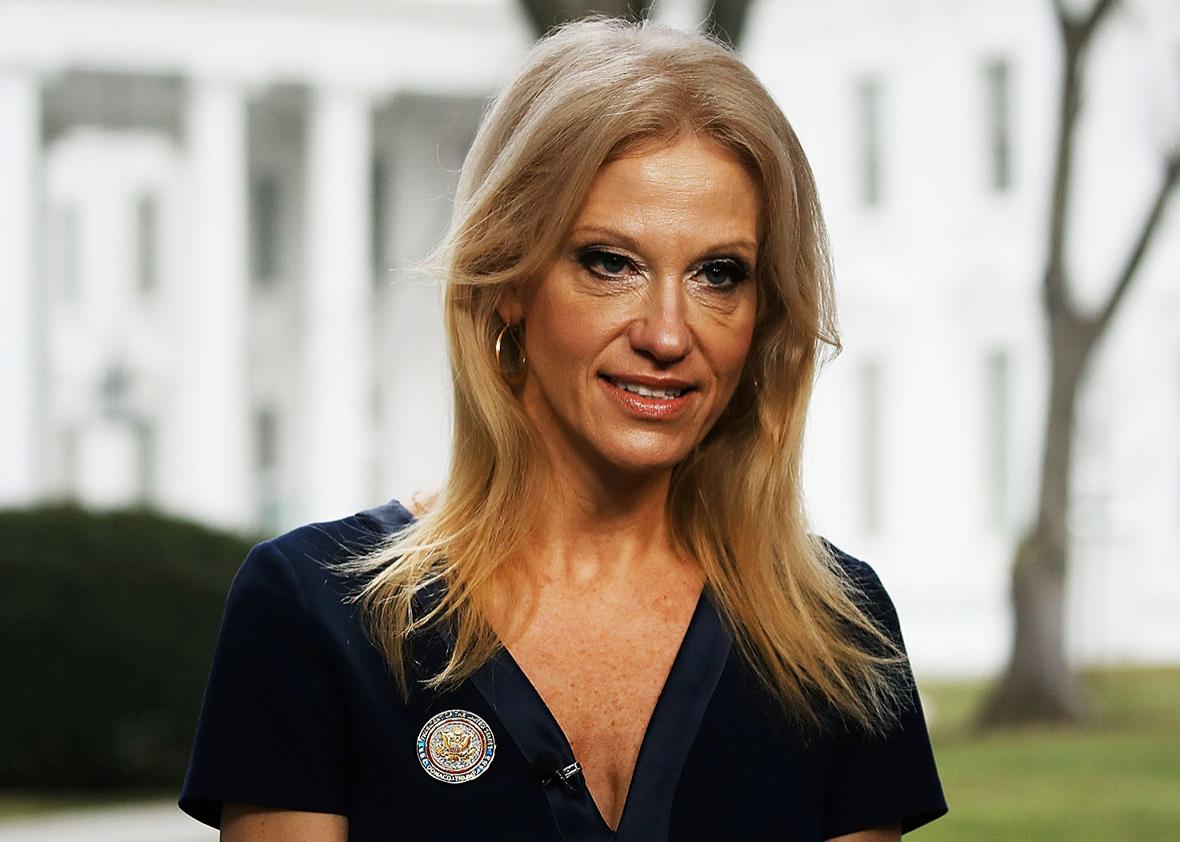On Sunday, Trump counselor and Vaseline salesperson Kellyanne Conway added “philosopher king” to her long list of job titles. In an interview on Meet the Press, Conway proposed a handy heuristic framework for thinking about Sean Spicer’s performance at the podium, wherein he insisted that Friday’s inauguration crowd “was the largest audience to ever witness an inauguration, period, both in person and around the globe.” Asked why President Donald Trump directed “the White House press secretary to come out in front of the podium for the first time and utter a falsehood,” Conway chided Todd for being “overly dramatic.” Spicer, she explained, was merely presenting “alternative facts.”
“Alternative facts?” Todd spluttered. “Look, alternative facts are not facts. They’re falsehoods.”
Conway likely meant that Spicer was offering other facts—new data that would complicate the Trump’s-crowd-was-teeny-tiny picture the press was painting. In reality, Spicer—who gave out bogus stats on Metro ridership and claimed falsely that the 2017 inauguration was the first to feature floor coverings—was voicing alternatives to facts. That is, fictions. Or: lies.
Todd is not the only journalist to shy away from calling a lie a lie. (Last year, the Washington Post outlined some of the reasons reporters avoid the l word.) His euphemism, falsehood, doesn’t presume the intent to deceive. It graciously leaves open the possibility that Spicer was just misinformed or mistaken. But this tactic has resulted in a bitter sort of irony: Eager to demonstrate how fair, sober, and truthful his journalism is, Todd wound up obfuscating the truth—that the White House concocted a series of fibs designed to make Trump seem more popular than he is. In this context, is it really any better to call Spicer’s sputterings falsehoods rather than alternative facts?
It’s undeniable, though, that alternative facts is an amazing coinage—the label this deeply stupid episode deserves. For one thing, the phrase calls to mind the snake-oil salesmanship that has animated Trump’s rise to power. The term alternative medicine arose in 1974 to describe unorthodox or scientifically unproven methods of healing and care. As Alan Levinovitz notes, the word alternative often serves to “collapse epistemologies”—to destabilize the foundations of our knowledge and make us feel that traditional sources of information cannot be trusted. The modifier’s connotation of gutsy, even glamorous independence also lends credibility to the rogue alt-right, which represents a large and terrifying swath of Trump’s support.
Most of all, alternative facts evokes a total alienation from—and disinterest in—objective truth. Twitter immediately compared Spicer’s bombastic and astonishingly incorrect propaganda to the nationalist reveries of Baghdad Bob (Mohammed Saeed al-Sahaf), the Iraqi information minister known for statements such as, “Shock and awe? It seems that we are the awe on them. They are suffering from the shock and awe, OK?” The coach of the Golden State Warriors also took a jab at Spicer after his team defeated the Orlando Magic. Asked to comment on the public address announcer’s description of him as a “former Orlando Magic great” (his legacy in Florida was apparently unremarkable), Steve Kerr quipped, “Sean Spicer will be talking about my career any second. 14,000 points.”
The internet’s meme factories likewise exploded, with Lance Bass tweeting that “As a member of the @backstreetboys, I had a love child with @BettyMWhite. #AlternativeFacts” and Marvel writer Dan Slott asserting that “Frankenstein isn’t the name of the monster or the doctor. It’s the name of the castle.”
Har har. The Orwellian reality, however, is that the White House’s prevarications aren’t just bad information. They may well be theatrically, obviously bad information dumps—in other words, politically motivated attempts to provoke us into spasms of righteous fact-checking. It’s hard to pay attention to the millions of protestors across the world uniting against Trump when you are gazing, gobsmacked, from 2009 photo to 2017 photo and back again, wondering how anyone could possibly maintain that the latter crowds dwarfed the former.
On Monday, Spicer returned to the fray with a white flag of sorts, acknowledging that the Metro ridership numbers he’d referred to over the weekend (obtained by “an outside agency,” he clarified) “were different” from the correct ones Metro had recorded. “That wasn’t like we made them up out of thin air,” Spicer said. Perhaps it’s encouraging that the White House was willing to walk back a particularly egregious howler, although I’m not sure Spicer would have relented if there was any possibility he’d get away with the deception. “I believe we have to be honest,” Spicer added, conjuring the riddle in which the liar answers questions about whether or not he is a liar. “I think sometimes we can disagree with the facts. Our intention is never to lie to you.” Intentions, huh? The road to an alternative to heaven is paved with Sean Spicer’s intentions.
